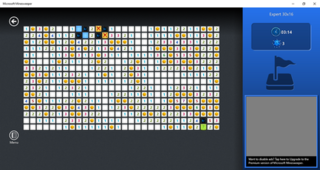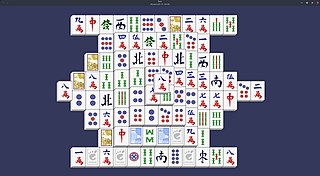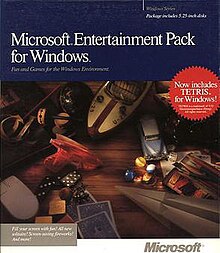Microsoft Windows was announced by Bill Gates on 10 November 1983, 2 years before it was first released. Microsoft introduced Windows as a graphical user interface for MS-DOS, which had been introduced two years earlier. The product line evolved in the 1990s from an operating environment into a fully complete, modern operating system over two lines of development, each with their own separate codebase.

FreeCell is a solitaire card game played using the standard 52-card deck. It is fundamentally different from most solitaire games in that very few deals are unsolvable, and all cards are dealt face-up from the very beginning of the game. Although software implementations vary, most versions label the hands with a number.

SkiFree is a single-player skiing computer game created by Chris Pirih and released with Microsoft Entertainment Pack 3 for Windows 3.0 in October 1991. The player controls a skier on a mountain slope, avoiding obstacles while racing against time or performing stunts for points, depending on the game mode.

Spider is a type of patience game, and is one of the more popular two-deck solitaire games. The game originates in 1949, and its name comes from a spider's eight legs, referencing the eight foundation piles that must be filled to win the game.

After Dark is a series of computer screensaver software introduced by Berkeley Systems in 1989 for the Apple Macintosh, and in 1991 for Microsoft Windows.

Full Tilt! Pinball is a pinball video game developed by Cinematronics and published by Maxis in 1995. It features pre-rendered 3D graphics and three tables: Space Cadet, Skullduggery, and Dragon's Keep. On each table, side displays show the players' scores, ball numbers, player numbers, various other information, and a table-specific image. A sequel called Full Tilt! Pinball 2 was released in 1996.
Microsoft Plus! is a discontinued commercial operating system enhancement product by Microsoft. The last edition is the Plus! SuperPack, which includes an assortment of screensavers, themes, and games, as well as multimedia applications. The Microsoft Plus! product was first announced on January 31, 1994, under the internal codename "Frosting". The first edition was an enhancement for Windows 95, Windows 95 Plus!
There were various games and applications available in Windows Live Messenger that could be accessed via the conversation window by clicking the games icon and challenging a "buddy".

Microsoft Mahjong is a computer game version of mahjong solitaire published by Microsoft. The version titled Mahjong Titans was developed by Oberon Games and included in Windows Vista and Windows 7. It takes advantage of the new graphical user interface (GUI) of Windows Vista, and includes features such as tile set and background choices. The game did not make it to Windows 8; however, a standalone version, developed by Arkadium and published by Microsoft Studios, can be downloaded from the Windows Store free of charge and played without download on the web.

Spider Solitaire, also known as Microsoft Spider Solitaire, is a solitaire (NA)/patience (EU) card game that is included in Microsoft Windows. It is a version of Spider. As of 2005, it was the most played game on Windows PCs, surpassing the shorter and less challenging Klondike-based Windows Solitaire.

Solitaire is a computer game included with Microsoft Windows, based on a card game of the same name, also known as Klondike. Its original version was programmed by Wes Cherry, and the cards were designed by Susan Kare.

Microsoft Entertainment Pack: The Puzzle Collection is a collection of 10 puzzle computer games developed by Mir - Dialogue and published by Microsoft Games. The creator of Tetris, Alexey Pajitnov, designed some of the games featured in the pack. It was released on CD-ROM for Windows 95. It was also bundled as part of the Microsoft Plus! Game Pack which was released after Windows Me.

Microsoft Minesweeper is a minesweeper-type video game created by Curt Johnson, originally for IBM's OS/2, that was ported to Microsoft Windows by Robert Donner, both Microsoft employees at the time. First released as part of the Microsoft Entertainment Pack 1 in 1990, it was first included in the standard install of Windows 3.1 in 1992, replacing Reversi from Windows 3.0. Microsoft Minesweeper was included without major changes in all subsequent Windows releases until Windows Vista, at which time an updated version by Oberon Media replaced it. In Windows 8 and later the game is not included with a fresh Windows install, but Microsoft Studios has published an updated version of it, developed by Arkadium, on Microsoft Store.

FreeCell, also known as Microsoft FreeCell, is a computer game included in Microsoft Windows, based on a card game with the same name.

Windows 3.0 is the third major release of Microsoft Windows, launched in 1990. Its new graphical user interface (GUI) represents applications as clickable icons, instead of the list of file names in its predecessors. Later updates expand capabilities, such as multimedia support for sound recording and playback, and support for CD-ROMs.

Mahjong solitaire is a single-player matching game that uses a set of mahjong tiles rather than cards. It is more commonly played on a computer than as a physical tabletop game.
TicBits Ltd. is a mobile game development company based in Turku, Finland, founded in 2010 by cousins Fredrik and Niklas Wahrman. The company specializes in both original games, mainly for the iOS platform, as well as its own interpretations of classic games. In Deloitte Technology Fast 50 Finland 2013, TicBits was placed third in the Rising Stars 2013 list. In July, 2016 Ticbits was acquired by ASX-listed mobile game developer Animoca Brands for 5.4 million AUD.

Microsoft Solitaire Collection is a video game developed by Microsoft Casual Games and published by Xbox Game Studios for Microsoft Windows. It combines the Solitaire, FreeCell and Spider Solitaire titles that were included with previous versions of Windows. It also introduces Pyramid and TriPeaks to Windows for the first time, as well as new daily challenges and themes. Unlike the games included in Windows 7 and earlier versions, Microsoft Solitaire Collection is freemium adware with Xbox Live integration.













